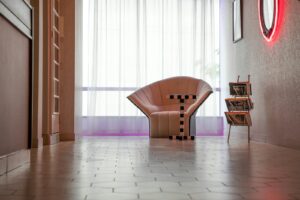Keeping your engineered hardwood floors clean and pristine can be a challenge, especially with the myriad of cleaning products and methods available. From the fear of damaging the delicate wood to the frustration of ineffective cleaning routines, finding the right solution can feel like navigating a maze.
Whether you’re contending with stubborn stains, worried about using the wrong products, or simply seeking a straightforward cleaning regimen, this guide is tailored to alleviate those concerns and equip you with the knowledge and techniques necessary to maintain your engineered hardwood floors with confidence and ease.
How To Clean
Sweep or Vacuum Regularly
Use a soft-bristled broom or a vacuum cleaner with a soft brush attachment to remove dust, dirt, and debris regularly. This prevents scratches and keeps the floor looking clean.
Damp Mop
Use a damp mop with a pH-neutral hardwood floor cleaner. Avoid using excessive water, as it can damage the wood. Wring out the mop thoroughly so it’s just damp, and then mop the floor in the direction of the wood grain.
Spot Clean Spills Immediately
Wipe up spills and stains immediately with a slightly damp cloth or paper towel. Avoid using harsh chemicals or abrasive cleaners, as they can damage the finish.
Avoid Excess Water
Engineered hardwood floors are more resistant to moisture than solid hardwood, but it’s still essential to avoid excess water. Never leave standing water on the floor, as it can seep into the wood and cause warping or damage.
Use Furniture Pads
Place felt pads or furniture glides under furniture legs to prevent scratches and dents when moving furniture across the floor.
Protect High-Traffic Areas
Place rugs or mats in high-traffic areas, such as entryways and hallways, to protect the floor from wear and tear.
Avoid Steam Cleaners
While steam cleaners are effective for some types of flooring, they can damage engineered hardwood by forcing moisture into the wood and causing swelling or warping. Stick to gentle cleaning methods.
Regular Maintenance
Every few months, consider using a hardwood floor cleaner specifically designed for engineered wood to give the floor a deeper clean. Follow the manufacturer’s instructions for best results.
By following these steps, you can keep your engineered hardwood floors looking beautiful for years to come.
Home-made cleaners for engineered hardwood
Certainly! Homemade cleaners can be effective and economical for cleaning engineered hardwood floors. Here are two homemade cleaner recipes along with their benefits:
Vinegar and Water Solution
Recipe: Mix equal parts of water and white vinegar in a spray bottle.
Benefits:
Vinegar is a natural disinfectant and helps to kill bacteria and germs, making it ideal for cleaning hardwood floors.
It is a mild acid, which can help to dissolve dirt and grime without damaging the finish of the floor.
This solution is safe for use on engineered hardwood floors as long as it’s used in moderation and properly diluted.
Tea Tree Oil and Water Solution
Recipe: Add a few drops of tea tree oil to a spray bottle filled with water.
Benefits:
Tea tree oil has natural antibacterial and antifungal properties, making it effective for cleaning and disinfecting hardwood floors.
It leaves behind a fresh, pleasant scent, unlike the strong vinegar smell.
Tea tree oil is gentle on the wood and won’t cause any damage when used in small amounts.
Baking Soda and Water Paste
Recipe: Mix baking soda with water to form a paste.
Benefits:
Baking soda is a gentle abrasive that can help to remove stubborn stains and dirt from hardwood floors without scratching the surface.
It also helps to neutralize odors, leaving the floor smelling fresh and clean.
This paste is safe for use on engineered hardwood floors, but it’s essential to rinse it off thoroughly with water after cleaning to prevent residue buildup.
These homemade cleaners are effective, affordable, and safe for use on engineered hardwood floors. However, it’s essential to test any cleaner in a small, inconspicuous area first to ensure compatibility with your specific flooring. Additionally, always use them in moderation and avoid using excessive water, as prolonged exposure to moisture can damage the wood.
Commercial cleaners for engineered hardwood
Bona Hardwood Floor Cleaner
Bona is a well-known brand that offers a range of hardwood floor cleaners, including options specifically formulated for engineered hardwood.
pH-balanced formula: Bona’s hardwood floor cleaners are pH-balanced, which means they are gentle on the wood and won’t damage the finish.
Greenguard Gold certification: Many of Bona’s cleaners are Greenguard Gold certified, meaning they meet strict chemical emissions standards and are safe for use in homes, including those with children and pets.
Residue-free: Bona’s cleaners leave behind no dulling residue, keeping your floors looking clean and shiny.

Method Squirt + Mop Wood Floor Cleaner
Method is a popular eco-friendly cleaning brand that offers a wood floor cleaner suitable for engineered hardwood.
Benefits:
Plant-based formula: Method’s wood floor cleaner is made with plant-based ingredients, making it safer for the environment and for use around pets and children.
No-wax formula: This cleaner is formulated to clean without leaving behind any waxy residue, ensuring your floors stay clean and shiny.
Easy to use: Method’s squirt-and-mop design makes it convenient and mess-free to apply, requiring no dilution or mixing.

Murphy Oil Soap Wood Cleaner
Murphy Oil Soap has been a trusted name in wood cleaning for over a century and offers a wood cleaner suitable for engineered hardwood floors.
Benefits:
Natural ingredients: Murphy Oil Soap is made with natural ingredients, including pure vegetable oil soap and natural citrus extracts, making it gentle on wood surfaces.
Versatile: In addition to cleaning hardwood floors, Murphy Oil Soap can also be used to clean other wood surfaces in your home, such as furniture and cabinets.
Removes dirt and grime: Murphy Oil Soap effectively removes dirt, grease, and grime from hardwood floors, leaving behind a clean, fresh scent.

These commercial cleaners are specifically formulated to clean and protect engineered hardwood floors without causing damage to the wood or finish. They offer convenience, effectiveness, and peace of mind, making them excellent choices for regular maintenance of your engineered hardwood floors.
Cleaning stains on Engineered hardwood flooring
Cleaning stains on engineered hardwood flooring requires careful attention to prevent damage to the wood. Here’s a general method for treating stains.
Identify the Type of Stain: Determine the nature of the stain (e.g., water-based, oil-based, food, pet stains) to choose the appropriate cleaning method.
Blot the Stain: Use a clean, soft cloth or paper towel to blot up any excess liquid or residue from the stain. Avoid rubbing, as this can spread the stain further.
Prepare a Cleaning Solution: Depending on the type of stain, prepare a suitable cleaning solution. For water-based stains, use a mixture of water and mild detergent. For oil-based stains, use a solvent-based cleaner or a mixture of vinegar and water.
Test in a Small Area: Before applying the cleaning solution to the entire stain, test it in a small, inconspicuous area of the floor to ensure it doesn’t cause any damage or discoloration.
Apply the Cleaning Solution: Using a soft cloth or sponge, apply the cleaning solution to the stain. Gently work the solution into the stain, being careful not to saturate the wood.
Let the Solution Sit: Allow the cleaning solution to sit on the stain for a few minutes to penetrate and loosen the stain.
Gently Scrub the Stain: Use a soft-bristled brush or a sponge to gently scrub the stain in a circular motion. Avoid using abrasive scrubbers or harsh chemicals, as they can damage the wood.
Rinse Thoroughly: Wipe away the cleaning solution with a clean, damp cloth to rinse the area thoroughly. Ensure all traces of the cleaning solution are removed from the floor.
Dry the Area: Use a dry, clean cloth to pat the area dry. Avoid leaving any excess moisture on the floor, as it can damage the wood.
Inspect and Repeat if Necessary: Inspect the area to see if the stain has been removed. If necessary, repeat the cleaning process until the stain is no longer visible.
Cleaning Harsh stains on Engineered hardwood flooring
For tougher or more stubborn stains on engineered hardwood flooring, such as ink, marker, or pet stains, you may need to use stronger cleaning methods. Here’s how to tackle harsh stains:
Identify the Stain Type: Determine the nature of the stain to choose the appropriate cleaning method. For example, ink stains may require a different approach than pet stains.
Spot Test: Before applying any harsh cleaners to the stain, spot test the cleaner in an inconspicuous area of the floor to ensure it doesn’t cause damage or discoloration.
Use a Specialty Cleaner: For tough stains, consider using a specialty hardwood floor cleaner specifically designed to remove stains. These cleaners are formulated to be stronger than regular cleaning solutions and can effectively break down stubborn stains without damaging the wood.
Apply the Cleaner: Follow the manufacturer’s instructions to apply the specialty cleaner to the stain. Use a soft cloth or sponge to work the cleaner into the stain, applying gentle pressure as needed.
Let it Sit: Allow the cleaner to sit on the stain for the recommended amount of time to penetrate and break down the stain.
Scrub Gently: Use a soft-bristled brush or sponge to gently scrub the stain in a circular motion. Avoid using abrasive scrubbers, as they can scratch the wood.
Rinse Thoroughly: After scrubbing, wipe away the cleaner with a clean, damp cloth to rinse the area thoroughly. Ensure all traces of the cleaner are removed from the floor.
Dry the Area: Pat the area dry with a dry, clean cloth to remove any excess moisture.
Inspect and Repeat if Necessary: Inspect the area to see if the stain has been removed. If the stain persists, repeat the cleaning process as needed until the stain is no longer visible.
When using commercial cleaner
When using commercial cleaners for tougher stains on engineered hardwood floors, it’s essential to follow the manufacturer’s instructions carefully to achieve the best results. Here’s a general guide on how to use these cleaners for tougher stains:
Read the Instructions: Start by carefully reading the instructions provided on the cleaner’s packaging. Pay attention to any safety precautions and specific usage guidelines.
Prepare the Area: Remove any furniture or obstacles from the area to be cleaned to allow for easier access. Sweep or vacuum the floor to remove any loose dirt or debris.
Spot Test: Before applying the cleaner to the stained area, perform a spot test in an inconspicuous area of the floor to ensure compatibility and to check for any adverse reactions.
Apply the Cleaner: Apply the commercial cleaner directly to the stained area according to the manufacturer’s instructions. You may need to spray the cleaner directly onto the stain or apply it to a clean cloth or sponge.
Let it Sit: Allow the cleaner to sit on the stain for the recommended amount of time specified on the packaging. This allows the cleaner to penetrate and break down the stain.
Scrub Gently: After the cleaner has had time to work, use a soft-bristled brush or sponge to gently scrub the stained area. Work in a circular motion, applying light pressure as needed to lift the stain.
Wipe Away: Once you’ve scrubbed the stained area, use a clean, damp cloth to wipe away the cleaner and any loosened dirt or residue. Be sure to thoroughly rinse the area to remove all traces of the cleaner.
Dry the Area: Use a dry, clean cloth to pat the area dry and remove any excess moisture. Avoid leaving the floor wet, as prolonged exposure to moisture can damage the wood.
Inspect and Repeat if Necessary: Inspect the area to see if the stain has been removed. If the stain persists, you may need to repeat the cleaning process or try a different approach, such as using a stronger concentration of the cleaner or letting it sit for a longer period.
Finish with Regular Cleaning: Once the stain has been removed, finish by cleaning the entire floor using your regular cleaning routine to ensure a consistent finish.
Read More
Hardwood Flooring Over Radiant Heating Systems?
Engineered Hardwood vs Hardwood Pros and Cons?





